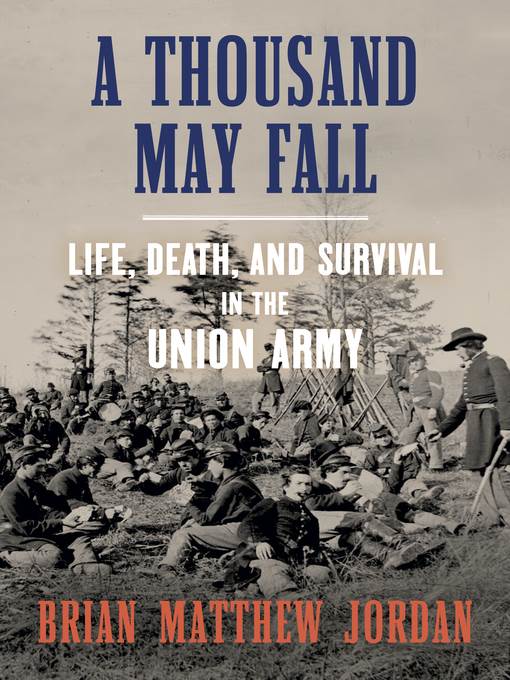
A Thousand May Fall
Life, Death, and Survival in the Union Army
کتاب های مرتبط
- اطلاعات
- نقد و بررسی
- دیدگاه کاربران
نقد و بررسی

Starred review from November 23, 2020
Historian Jordan (Marching Home) delivers a captivating chronicle of the 107th Ohio Volunteer Infantry during and after the Civil War. Composed mainly of German immigrants living in Ohio, the 107th was the target of Stonewall Jackson’s furious attack at the Battle of Chancellorsville in May 1863. Two months later, the 107th was “thrashed” at the Battle of Gettysburg. For these two disastrous encounters, the regiment was vilified by the northern press. Jordan portrays Ohio as a hotbed of antiwar sentiment; details how one private in the 107th won the Medal of Honor; and recounts the lengths veterans went to in order to secure pensions and medical benefits for themselves and their loved ones. Annual reunions brought emotional relief to the 107th’s survivors, Jordan writes, and produced two regimental histories that served to fend off criticism of the Union Army’s ethnically German soldiers in the years after the war. Jordan profiles his characters with precision, revealing the deep emotional and physical scars they carried back from the conflict. This meticulous and engrossing history brings the Civil War to vivid life.

January 1, 2021
Award-winning author Jordan's (Marching Home) regimental history of the 107th Ohio tells a complex and tragic story from the American Civil War. The regiment was composed mainly of ethnic Germans who came from communities that largely did not support the war. Because of their ethnicity and background, they were not trusted or respected by the Northern press, and because of their decision to fight for the Union, they were ostracized by loved ones at home. The author explains how the regiment was poorly led both at the regimental level and by their commanding generals, and saw horrific losses at Chancellorsville and Gettysburg. Jordan continues by explaining how and why they were one of only a few regiments in the U.S. Army to support George B. McClellan in the 1864 election. In addition to hundreds of deaths, many in the regiment were badly wounded, finding it difficult to adjust to civilian life or receive relief from the military pension board. Surviving members of the regiment took up their pens to try to draw meaning from the war and defend the performance of their comrades with limited success. VERDICT The personal sacrifice of soldiers in war often gets lost in military histories, and Jordan's moving account of the 107th Ohio is a welcome corrective.--Michael Farrell, Reformed Theological Seminary, Orlando, FL
Copyright 2021 Library Journal, LLC Used with permission.

March 1, 2021
Affecting portrait of an Ohio infantry regiment in the Civil War. Jordan, a historian who has previously focused on Union veterans in the postwar era, follows a promising and fresh approach by studying the war through the lens of a single unit. In this instance, the 107th Ohio Volunteer Infantry was made up largely of immigrants, one of 30 "ethnically German" regiments in the Union Army. Two prevailing views of Union soldiers have emerged in the literature: one of a tireless and determined force, the other of a battle-weary mob just this side of collapsing. As Jordan demonstrates, neither view is quite correct, and neither is quite wrong. The men he portrays in this account were "betwixt and between, men who belonged but did not"--but who took it as their duty to fight for their new country. Their defeat at Chancellorsville soon led to Gettysburg. "It would be difficult to imagine a worse position than the one the 107th Ohio had been ordered to assume in Gettysburg that afternoon," writes the author, facing down hardened Rebel fighters in a fixed-bayonet infantry charge. Before these battles, the 107th had endured Ambrose Burnside's infamous "Mud March" and been elevated in morale by the arrival of Joseph Hooker, who allowed the Ohioans 15-day leaves to accommodate travel west. Not all of them returned to the fight, and many who came back did not survive. At Gettysburg, Jordan writes, "of the 458 men who entered the fight that morning, no more than 171 limped back to Cemetery Hill." Reflecting the author's previous scholarly interest, much of the book concerns the final year of the war and the immediate postwar era, when families at home suffered from those losses as well. Movingly, he writes in an epilogue of a reunion of the regiment at Gettysburg, when the men "gripped walking sticks, not rifled muskets" and remembered their fallen brothers in arms. A well-conceived, thoughtfully written contribution to Civil War history.
COPYRIGHT(2021) Kirkus Reviews, ALL RIGHTS RESERVED.

























دیدگاه کاربران